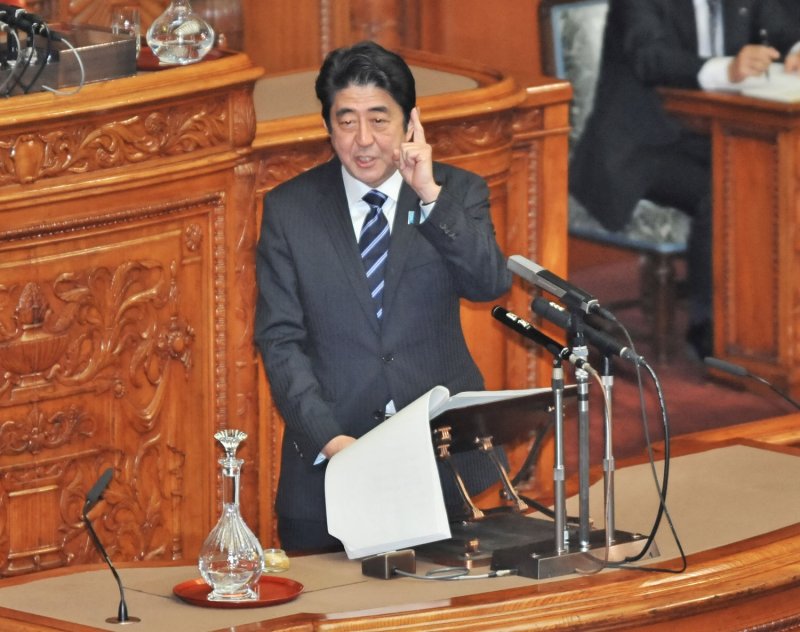Japan's Prime Minister Shinzo Abe delivers a policy speech during a plenary session of the House of Councillors in Tokyo, Japan on January 28, 2013. UPI/Keizo Mori |
License Photo
WASHINGTON, July 24 (UPI) -- The ruling Japanese Liberal Democratic Party's landslide victory in the Upper House elections was effectively a referendum about Prime Minister Shinzo Abe's economic policy to date.
With the LDP now controlling both houses of the Diet, and Abe's leadership more secure than ever, the question is how and whether he will be able to move forward beyond the first phase of Abenomics.
By securing a majority in both the Upper and Lower House, which hasn't been achieved by any government since 2007, hopes are high that the prime minister will be able to move forward on key issues that have hampered not only Japan's economic growth over the past two decades but also press ahead on hurdles perceived to have kept the country's global presence back as well.
It may, however, become increasingly difficult to keep up with the pace of success enjoyed during the first six months of Abe's government, even with bicameral support.
The 40 percent surge in the Japanese stock market since he took office last December, which has been heralded as a key achievement of Abenomics, would be difficult to sustain. Investors will increasingly look for more concrete plans that address the fundamental weakness of the country's economy, including tackling the unsustainable debt-to-GDP ratio and weaning Japan off massive public spending projects, which have hitherto spurred growth.
Granted, the government has repeatedly pledged to pursue structural reform to ensure longer-term economic expansion. Yet it has been far more comfortable with pursuing other stimulus measures, namely having the Bank of Japan ease monetary policy aggressively and moving forward with bolstering government expenditure.
Having secured his political footing, Abe ought to find it easier to push through reform, which should include plans to capitalize on the female workforce and cut back on social welfare programs for the elderly. The question will increasingly be whether the LDP actually has the political will and vision to pursue policies that won't have an immediate impact on the bottom line.
Granted, the administration's commitment to trade liberalization by applying for membership to the ambitious Trans-Pacific Partnership free trade agreement may trigger further reform but a comprehensive vision to encourage economic competitiveness is still lacking. What's more, Abe will most likely face formidable opposition from the powerful agricultural sector as TPP opens the floodgates for global competition.
Reforming the energy sector too will be of critical importance for the Abe government that will face tremendous backlash. More than two years have passed since the Fukushima nuclear disaster, and while Japan has effectively shut down all of its nuclear reactors, Abe remains committed to restoring the nuclear industry despite much opposition, from grass-root activists in particular.
Politically, on the other hand, Abe clearly has a vision for what Japan needs. His challenge, though, is how he will be able to garner enough support to see it through.
At the forefront is a plan to enhance Japan's military standing by growing the Self-Defense Force into a fully fledged military organization. While such a move would effectively only make Japan's military power come into line with most other countries in the world, it will be no easy task to press ahead.
A two-step process to reform the Japanese Constitution would be needed, firstly to make it possible to instigate change with half the votes in both houses, as opposed to requiring a two-thirds majority in both chambers under Article 96. The LDP would then propose to amend Article 9 of the post-World War II constitution to beef up Japan's military presence beyond simply providing self-defense.
Pursuing the latter will be a particularly sensitive issue for Japan's neighbors, with both China and South Korea voicing strong opposition to what they fear will lead to a resurgence of militarism in Tokyo.
The list of challenges facing Abe continues to grow and yet his leadership beyond monetary policy and public spending are still hazy. The latest electoral victory gives the prime minister the much-needed political clout to push through policy changes that will undoubtedly face opposition from various quarters. The onus is upon him to capitalize on the popularity that he currently enjoys and stay the course in pursuing change even as the voice of opposition gains ground.
--
(Shihoko Goto is the Northeast Asia associate at the Woodrow Wilson International Center for Scholars' Asia Program in Washington. She is also a former business editor for United Press International.)
--
(United Press International's "Outside View" commentaries are written by outside contributors who specialize in a variety of important issues. The views expressed do not necessarily reflect those of United Press International. In the interests of creating an open forum, original submissions are invited.)















